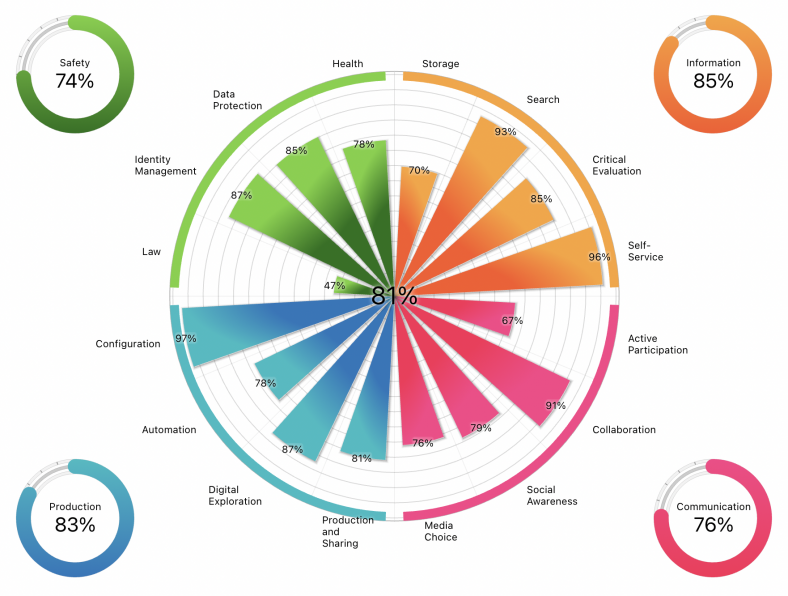I was one of the topic leaders this week. As a topic leader, I took a deeper dive into digital literacies than I have before and learned a lot by delegating tasks and discussing with others. I think of myself as quite digital literate person in this digital age and it has a lot to do with my background in engineering and my video gaming hobby as a teenager. Topic 1 was a good start to ONL. I really like the 1 hour meetings. It is a good way to get to knew the people, and I feel I’ve met them, even tough we have only discussed in a video chat. I think that has more merit to it than you would expect because this pandemic has shown me it is harder to get to know people through zoom than in real-life, since video chat gives different first impressions than meeting physically.
During the investigation phase of our PBL group, I found a very good overall test called “The digital competence wheel” developed by an EU research project, DIGCOMP. These range from copyright and licensing, passwords, using hotkeys, detecting what is phishing and malware, social media use, sensitive information, digital tools, communication, creating content, using multimedia, using the latest tech, etc. The test is a bit long but very conclusive and has great descriptions for the questions and visuals. From the end result, I could see that I should focus on improving law, active participation and storage to improve my overall digital literacy.

My digital competence results.
I already knew that laws, regulations and copyrights are something I need to focus on. It seems that these topics do not bug me daily, so I am putting off learning more about them. Currently, I am puzzled about drawing an illustration about a commercial robot and can I then use it in a research paper? The illustration is drawn with the commercial robot underneath, as a guide to help me draw, so do I still need to ask permission from the commercial robot company or not?
Participation is also something that I knew I lack. But I guess it begs the question: “Do I need to be active in private social media (Facebook, Instagram, etc.) or public/work (LinkedIN, ResearchGate, Twitter)?”. I though for a long time that it is not necessary but I’m beginning to get the feeling of it actually might be necessary. I taken my first step. I’ve made blog at the beginning of this year to share my “first hand findings and thoughts” about my research. I have mainly done it for myself, to use writing for examining my thoughts and the new observations. I have noticed that sharing that text publicly, even if no one reads it, sets a certain threshold of quality and clearness for the text. I think that it is a good thing – the text can be casual but it has to be informative and clear.
Last and least: digital storages. I do not consider this a main issue of mine, even through the tests did reveal that I need to improve my knowledge of digital storages, it is not my main concern at the moment. I will address this weakness when I have a good reason to put more time into it, since I’m already good at local and cloud data, accessing data for APIs and whatnot. Next would be big data and creating my own APIs.
All and all, I found Topic 1 of ONL fun and informative. Also writing this blog post was a good idea to scan my through my thoughts.

Hi Jari,
It is great to hear that you volunteered to be the topic leader for the first topic! I agree that it is one of the most interesting themes in the course. Thanks for sharing the idea of the digital competence wheel. I have to try it myself! In which social media platforms are you planning to build a professional identity?
A great question. I guess LinkedIn would seem like a smart platform to focus on and maybe ResearchGate, since LinkedIn helps in networking and acts as a public resume while ResearchGate is a way to offer help and get help on research related issues.